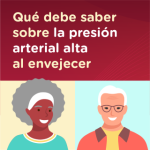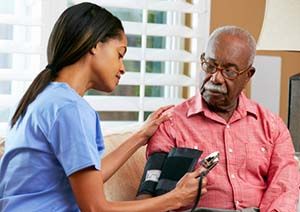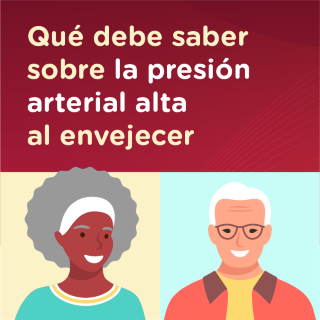

English
High blood pressure, or hypertension, is a major health problem that is common in older people. The network of blood vessels, known as the vascular system, changes with age. The arteries become stiffer, which causes blood pressure to rise. This can happen even in those people who have healthy habits and feel well. Often, high blood pressure (sometimes called the “silent killer”) does not cause any symptoms. Although high blood pressure affects nearly half of all adults, many may not even know they have it.
If high blood pressure is not controlled with lifestyle changes and medications, it can lead to serious health problems, including cardiovascular diseases (such as heart disease and stroke), vascular dementia, eye problems, and kidney disease. . The good news is that most people can control their blood pressure.
What is blood pressure?
Blood pressure is the force that blood exerts against the walls of the arteries when the heart pumps it. When your doctor or other health care professional takes your blood pressure, he or she puts a cuff around your arm that is connected to a small machine. This cuff inflates and then loosens little by little. The machine records the result which consists of two numbers. The first number corresponds to systolic blood pressure and is the pressure caused by the heart pumping blood out of the heart. The second number corresponds to diastolic blood pressure and is the pressure that occurs when the heart relaxes and fills with blood.
- The low blood pressure, or hypotension, is a systolic blood pressure of less than 90 or a diastolic blood pressure of less than 60. If you have low blood pressure, you may feel lightheaded, weak, dizzy, or even faint. This may be a result of not drinking enough fluids, blood loss, some medical conditions, or medications, including those prescribed for high blood pressure.
- The normal blood pressureFor most adults, this is defined as a systolic pressure of less than 120 and a diastolic pressure of less than 80.
- The high blood pressure It is considered a systolic pressure between 120 and 129 with a diastolic pressure of less than 80.
- The high blood pressure It is defined as a systolic pressure of 130 or more, or a diastolic pressure of 80 or more.
For older adults, often the first number (systolic pressure) is 130 or higher, but the second number (diastolic pressure) is less than 80. This problem is called isolated systolic hypertension and is due to the stiffening of the major arteries that occurs with age. This is the most common form of high blood pressure in older people and can cause serious health problems, including difficulty breathing during light physical activity, dizziness when standing up too quickly, and falls.
One reason to visit your doctor regularly is to have your blood pressure checked and, if necessary, plan how to control it.
Do I have high blood pressure?
Anyone can have high blood pressure. Some medical conditions, such as metabolic syndrome, kidney disease, and thyroid problems, can cause high blood pressure. Some people have a higher chance of having it because of certain things they can’t change, such as:
- Age. The likelihood of having high blood pressure increases with age, especially isolated systolic hypertension.
- The sex. Before age 55, men are more likely to have high blood pressure. Women are more likely to have high blood pressure after menopause.
- The family history. High blood pressure can run in families.
- The race. African Americans, or black people, have a higher risk of high blood pressure.
High blood pressure often has no signs or symptoms, but routine checks of your blood pressure will help detect if your levels are rising. If your blood pressure reading is high on two or more checkups, your doctor may also ask you to measure your blood pressure at home.
When deciding whether to start treatment for high blood pressure, seniors should consider other health conditions and their overall physical condition. You and your doctor will decide what the appropriate blood pressure is for you to feel well. Your doctor may suggest exercising, changing your diet, and taking medications.
How can I control my blood pressure?
You can often lower your blood pressure by changing your daily habits and, if necessary, taking medication. Treatment requires ongoing evaluation and conversations with your doctor, especially if you have other medical conditions, such as diabetes.
There are lifestyle changes you can make to help prevent or reduce high blood pressure:
- Try to maintain a healthy weight. Being overweight increases the risk of high blood pressure. Ask your doctor if you need to lose weight. In general, to maintain a healthy weight you should burn the same number of calories as you eat and drink.
- Exercise. Moderate activity, such as brisk walking or swimming, can reduce high blood pressure. Set goals to exercise safely and aim for at least 150 minutes (2.5 hours) per week. If you have any health problems that are not being treated, consult with your doctor before starting an exercise plan.
- Follow a heart-healthy diet. A balanced diet of vegetables, fruits, cereals, proteins, dairy products, and oils, like the DASH diet, can lower your blood pressure. DASH stands for Dietary Approaches to Stop Hypertension.
- Reduce salt intake. As you age, your body and blood pressure become more sensitive to salt (sodium), which is added to many foods during processing or preparation. Limiting the amount of salt you eat each day can help. DASH is a low salt diet.
- drink less alcohol. Drinking alcohol can affect blood pressure. If they drink, men should have no more than two drinks a day and women no more than one a day to reduce the risk of high blood pressure.
- Do not smoke. Smoking increases the risk of high blood pressure, heart disease, stroke, and other health problems. If you smoke, stop it. The benefits of quitting smoking can be noticed at any age. Remember, you are never too old to do this.
- Get a good night’s sleep. Tell your doctor if you have been told that you snore or sound like you stop breathing at times when you sleep. This may be a sign of a problem called sleep apnea. Treating sleep apnea and getting a good night’s sleep can help lower blood pressure.
- Manage stress. Coping with problems and reducing stress can help reduce high blood pressure.
In addition to recommending lifestyle changes, your doctor will likely prescribe medications to lower your blood pressure to a safe level. Isolated systolic hypertension, which is the most common form of high blood pressure in older people, is treated the same way as regular high blood pressure, but may require more than one type of medication to treat. You may try several types or combinations of medications before you find what works best for you. Medications can control your blood pressure, but they cannot cure it. If your doctor prescribes medication for high blood pressure, you may need to take it long-term.
Research shows benefits of controlling high blood pressure
Preventing and controlling high blood pressure is important for heart health and can also benefit brain health. The National Institutes of Health (NIH) funded a study of various interventions to treat systolic blood pressure, called the Systolic Blood Pressure Intervention Trial (SPRINT). This study found that reducing systolic blood pressure to less than 120 in adults over 50 years of age significantly reduced the risk of cardiovascular disease and death. Results from a related study showed that lowering systolic blood pressure to less than 120 reduced the risk of mild cognitive impairment, and an analysis of several large, long-term studies of adults over age 55 found that treating high blood pressure was associated with a reduced risk of developing Alzheimer’s disease.
Tips when taking blood pressure medications
Not treating high blood pressure can increase the risk of serious health problems. If your doctor prescribes medications to lower your blood pressure, remember:
- If you take blood pressure medication and it is low, it means the medications and lifestyle changes are working. If another doctor asks if you have high blood pressure, the answer is, “Yes, but I’m being treated for it.”
- Healthy lifestyle changes can help reduce the dosage you need of your medications.
- Get up slowly from a sitting or lying position and stay standing for a while before you start walking. This allows your blood pressure to adjust before walking to prevent dizziness and falls.
- Tell your doctor about all the medications you take. Don’t forget to mention over-the-counter medications, as well as vitamins and dietary supplements, as they can affect your blood pressure. These can also affect how your blood pressure medications work.
- Blood pressure medications should be taken at the same time every day as part of your daily routine. For example, take them in the morning with breakfast or in the evening before brushing your teeth. Talk to your pharmacist if you have any questions about when or how to take your medicine.
- Remember to refill your prescriptions before you run out and to take them with you when you travel. It is important to continue taking your medications unless your doctor tells you to stop.
- Before having surgery, ask your doctor if you should take your blood pressure medication on the day of your operation.
You might also be interested
For more information
The information contained in this document is provided by the National Institute on Aging (NIA), part of the National Institutes of Health, and has been reviewed by its scientists and other experts for accuracy. and is updated.
Text revised on: June 1, 2023



